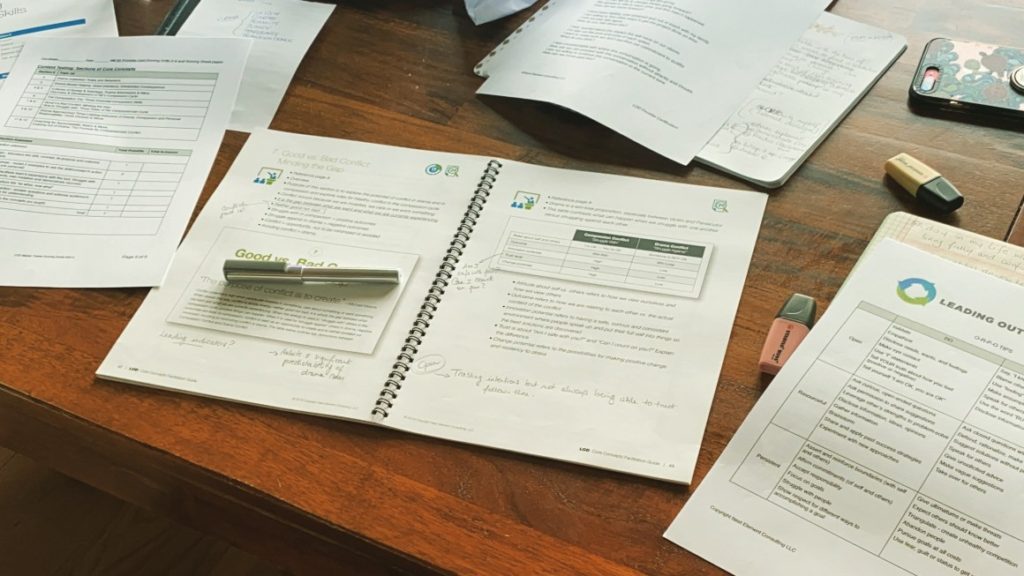Progression isn’t just something you need to do to further secure your finances. We are geared towards change. We might not always like it, but staying in the same situation with the same routine is exceptionally detrimental to our health and our futures. Moving forward, fighting for a better future – it is as human as it comes.
The one place that sets barriers, beyond just your choices and trials, is your career, it’s important to define career goals. Your career isn’t just who you meet or about putting yourself out there. There are very real barriers and steps you need to take before you can qualify for that next promotion, raise, or jump ahead in a new job.
Nowhere are these barriers more physical than in healthcare, where every new skill or ability you bring to the table must be backed up with more than references, but accredited degrees and state certifications. Other careers face similar barriers, like those who work in law or engineering. For careers with those levels of barriers, it isn’t just about pushing yourself at work or negotiating for higher pay; it’s about striving forward, working full-time jobs while furthering your education.
Progressing your career is both harder and easier when you work in a career that has very real barriers to your next promotion. To help you master that balance between work and study, between personal and professional, use this article to guide you:
Discovering Your True Dream Job: Think Beyond Childhood Hopes

Even in rigid career paths, there are branches. Pathways that you can take, but could only get to if you aim yourself at that goal with extreme precision. In healthcare, especially, it can be hard to backtrack to get the certifications that you need to qualify you for the exact role that you are looking for.
Being so direct and knowing what you want to do right from the start is a big ask, and though there is no guarantee you won’t change your passion later on in life, you can avoid a lot of hassle simply by making it your mission to know all of your options ahead of time.
Explore the Theoretical Side of Your Industry
One way to know your options is to understand your industry as a whole. In healthcare, you will want to narrow this down to your specific role type; otherwise, you will be bogged down with knowledge and choices that aren’t necessarily open to you. There are plenty of magazines, news, online publications, and so much more that would be of interest to you as well.
Nursing, for example, is a thriving career path that breaks off into dozens upon dozens of specializations, and, even then, you have many different job roles and workplaces that you can use your skills in. By knowing the areas of medicine and the job roles that nurses work in, you can gain a better understanding of how healthcare works, as well as your options.
If you go on to become an FNP, chief of nursing, or nursing director, you need to have an understanding of how all the different nursing roles work will be the key to your success.
Job Shadow and Ask Others

If you can, shadow other areas of medicine, or just different departments in your office if that is what applies to you. If you are currently an RN, then shadow Acute Care APRNs or FNP nurses. Get a feel for their job, their work/life balance, and remember to ask. You can ask and gain insight over a cup of some much-needed coffee without any shadowing, and, in turn, gain some serious insight into roles that you are interested in.
This way, you can turn a spark of passion into a commitment, which you will need later on when it actually comes down to working full-time while pursuing higher education and certifications to become an FNP yourself.
Look at Job Sites
Once you have a clear idea of what your dream role or title will be, whether that is an FNP or an RN, look it up on job sites. Get a feel for the qualifications that they are looking for, and make a plan to exceed them. You will want to look up a few different listings, just so you know what the standard is, and what is exceptional in terms of what employers are looking for.
While you should always aim to be exceptional to stand out and to secure the top level of play, that’s in the future. For now, you will want to focus on the standard qualifications you will need to work to achieve your dream role.
Completing the Degree: Everything You Need to Know from Enrolment to Graduation

With a full list of the qualifications that your industry sees as essential to get the dream job you want, you will then need to work backward. Build a career path for yourself that is simple and achievable. With careers in healthcare or similar, the path ahead of you will almost certainly involve higher education and further qualifications.
In these roles, it isn’t enough to have experience. You need to be legally signed off to accomplish the tasks currently taken by those higher up than you. This can put a damper on a lightning-fast career progression, but rushing is one of the worst ways to approach this. You need to be patient, to monitor your health and wellbeing, and to use these tips to help you successfully enroll, study, and complete your degree:
Why Your Resume Matters When You Enroll
Thousands of qualified prospective students are turned away from nursing degrees every single year. It isn’t because they couldn’t find funding or because they were worse than those who did get in. It’s simply because there is a shortage of nurse educators that are qualified to teach. This shortage means that your resume or CV matters. It is a competition to get in, especially to great degrees from the top schools.
This shortage applies to BSN, MSN, and DNP degrees, though there are typically fewer prospective students the higher up you go. To increase your chances of getting in, put effort and dedication into your application. Some degrees will even require you to have a few years of relevant experience, though you likely won’t find such a barrier for BSN or even MSN degrees.
Still, putting effort into your application, cleaning up your resume, and doing all you can to position yourself as a nursing star will help you immensely when it comes to being accepted. If you don’t, it doesn’t mean you weren’t good enough. Keep applying, and you will get accepted to a great nursing degree.
Why Where You Learn Matters

You don’t just want the bare bones of education. And when it comes to nursing and similar careers, you cannot afford to not choose the best. Accreditation might have its problems, but the fact remains you cannot take state exams without first proving you have a degree from a recognized body. It ensures a level of standard to the education in your state, but that accreditation is the bare minimum. You will also want to choose degrees that:
- Offer 1-on-1 coaching
- Provide placement opportunities
- Are designed to be completed by working professionals
You aren’t just getting a degree in a vacuum. The institution that you choose matters significantly because great universities strive to help their students succeed in every facet of their education and even career. Learn and take advantage of all the opportunities and resources available through your university.
Choosing the Right Degree for Your Goals
Your degree in healthcare and similar industries will propel your career forward, but you don’t want it to go in the wrong direction. With that in mind, it’s a good idea to stay as general as possible, for as long as possible, and then when you are sure, choose a degree of specialization that will help you achieve all your goals. Think of it like first building the launch pad, and then lifting off.
Stay as General As Possible for as Long as Possible, if You Can
There are always opportunities to take on further training later on, so while you can try to generalize your knowledge as much as possible. This will give you more time to get a feel for what you want to do with your career. You can then specialize later on with a master, or through certifications.
Choose the Degree that Helps You Reach Your Dream
Getting your masters’ through one of the RN to MSN programs online is where you will probably want to know where you want to specialize in. In nursing, it can be as simple as knowing what type of APRN you want to be. Nurse Practitioners are one of the most popular options, and there are many demographic options you can specialize in.
If you want something general that gives you the greatest options, then the most popular NP position is as an FNP. An FNP often replaces Primary Care Physicians and act as the primary point of care for families and their health. You will be working with children, adults, and seniors alike as an FNP can work in cities, all the way to the most rural areas.
An FNP is so vital, in fact, that they now have many of the same privileges and responsibilities as physicians do, simply because there is a massive shortage of Primary Care Professionals. An FNP will fill in that gap, and their work will help provide healthcare to everyone. Currently, there is an average of 32 million people at risk of not having access to clinical care. FNP nurses work to reduce these numbers and give everyone the healthcare they deserve.
The best part is that there are specialized, dedicated online FNP degrees. MSN degrees are the perfect time to specialize, as they lay the foundation and framework for your dream career.
Ongoing Education: The Drive that Will See You to Greatness

Things change, and as such, the world changes. New tools arrive on the market, new laws, and requirements. In a world that changes so much every year, it is not just silly to avoid continuing your education, but outright foolish.
In healthcare, it depends on the state. Some states will accept a minimum number of hours worked before they renew your license, like Alaska. Otherwise, many outright demand a number of hours be put into furthering your education with an FNP through one way or another. It could be through your degree, or it could be through ongoing training and certification.
This ongoing education is great for your mind and your career. It shows you are a real go-getter, and it will make you a hot commodity on the job market. The average for a nurse, even a high-level nurse, is around $100,000. If you are at the top of your career and can do so much more than a freshly graduated FNP, then your wage will just continue to go up and up so long as you work to negotiate for those pay raises.
Caring for Your Physical and Mental Health: The Essential Ingredient to Success
To complete that FNP degree while working and commit to ongoing education, you will need to be in peak physical fitness to do it all. Try to get in shape (in terms of exercise, your diet, and even your mental health) before you start the biggest juggle of your life. This can be hard, but you will not want to deal with old demons when starting it.
Being in a good place, both mentally and physically, is invaluable when you are taking on two stressful tasks at once. It will help you adjust to an appropriate routine and will help you succeed at work and in your studies.
Take the time to get into good physical health, then apply for your FNP. With your health on your side, you can handle later nights, can continue to study after a day of work, and you will succeed and see your dreams of becoming an FNP through.
WE SAID THIS: Tell us your thoughts down below.




